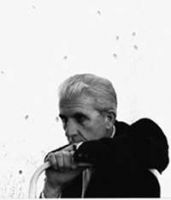
Composers
- bio
Fausto Razzi - Biography
Roma, 1932
Roma, 1932
Fausto Razzi was born in Rome in 1932. He studied at Conservatorio and Accademia Santa Cecilia in Rome with Rina Rossi (piano: 1950-1955) and Goffredo Petrassi (composition: 1957-59 and 1962-63). From 1958 to 1961 he was first assistant and then (1961 to 1968) successor to Franco Maria Saraceni as conductor of Rome University Choir. In 1966 he began teaching, eventually becoming professor of composition at L'Aquila and Pesaro Conservatories. His honours include mentions from the composition competition of the Italian section of the ISCM (1963, 1965) for Die helle Stimme and Improvvisazione respectively, and prizes from Prague Spring Festival (1966, Tre pezzi sacri) and from Milan Angelicum (1969, Musica per 26 strumenti). In 1976 he founded the vocal ensemble Gruppo recitar cantando, which specializes in the performance of polyphonic music and early monody. In 1983 he gave up teaching to devote himself to composition and vocal conducting.
Razzi's early works show the influence of the Second Viennese School, particularly the music of Webern, and a tendency towards pointillistic writing; this is particularly apparent in Quartetto (1958), four pieces for string quartet, the last of which employs 12-note technique. His exploration of vocal possibilities is another aspect of his early output. Improvvisazione III (1967) demonstrates his experimental vocal and graphic approach and also includes passages of controlled aleatory writing. From 1968 to 1970 with a series of pieces entitled Musica, Razzi arrived at a technique of durational canons which would become the basis of his compositional conception. His fondness for the abstract found ideal scope for development in electronic music, a genre in which he produced Progetto per una composizione elettronica (1971-73), Progetto II (1980) and A voi che lavorate sulla terra (1982). In the 1980s Razzi became interested in music theatre following his encounter with the poetry of Edoardo Sanguineti. Protocolli (1989-92), Smorfie (1997) and Incastro (2001) on Sanguineti texts reflect the writer's militant position in avant-garde poetry, striking a chord with Razzi's own enduring political commitment.
Updated to 03/2005 Razzi's early works show the influence of the Second Viennese School, particularly the music of Webern, and a tendency towards pointillistic writing; this is particularly apparent in Quartetto (1958), four pieces for string quartet, the last of which employs 12-note technique. His exploration of vocal possibilities is another aspect of his early output. Improvvisazione III (1967) demonstrates his experimental vocal and graphic approach and also includes passages of controlled aleatory writing. From 1968 to 1970 with a series of pieces entitled Musica, Razzi arrived at a technique of durational canons which would become the basis of his compositional conception. His fondness for the abstract found ideal scope for development in electronic music, a genre in which he produced Progetto per una composizione elettronica (1971-73), Progetto II (1980) and A voi che lavorate sulla terra (1982). In the 1980s Razzi became interested in music theatre following his encounter with the poetry of Edoardo Sanguineti. Protocolli (1989-92), Smorfie (1997) and Incastro (2001) on Sanguineti texts reflect the writer's militant position in avant-garde poetry, striking a chord with Razzi's own enduring political commitment.
